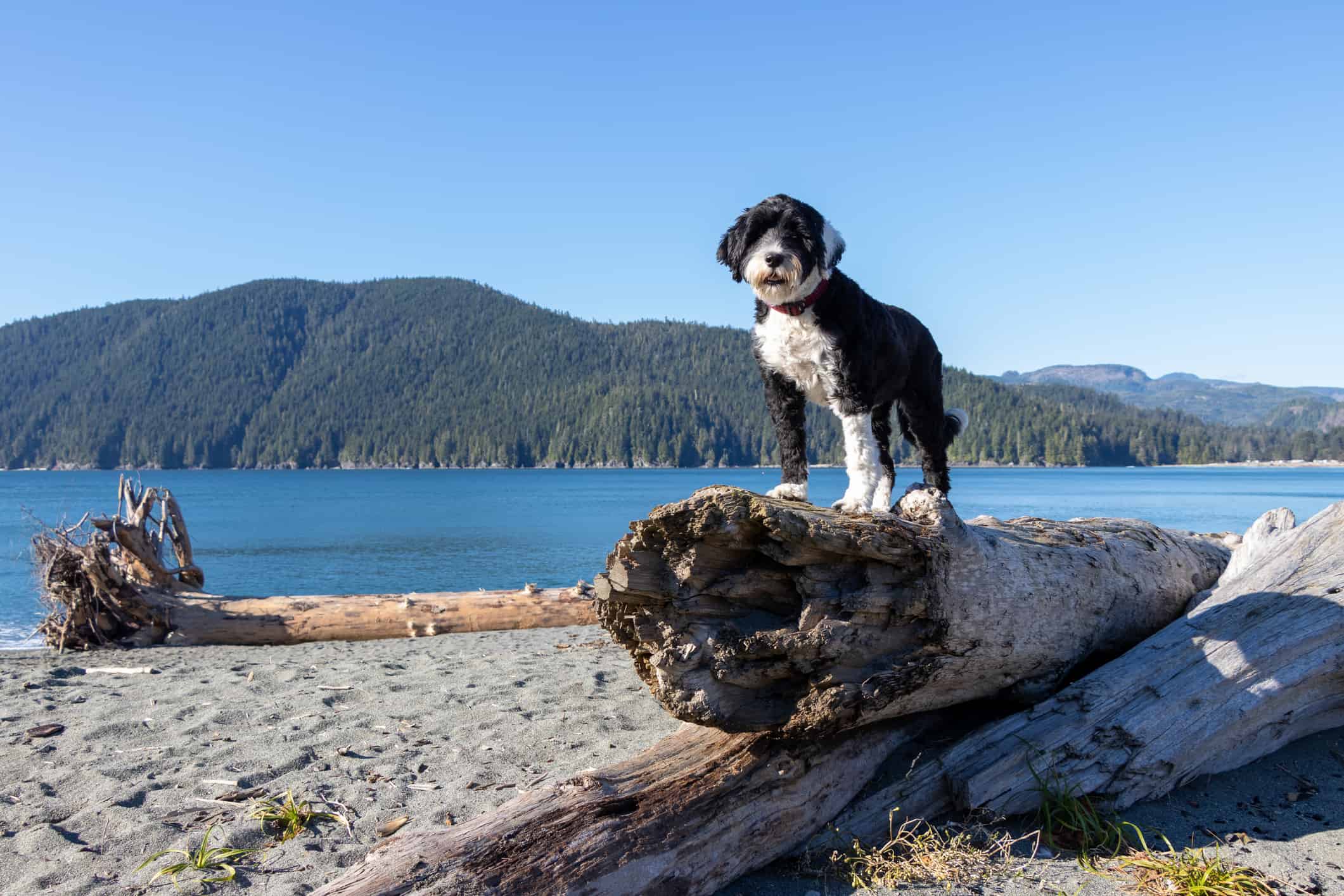The Portuguese water dog is an athletic, active, and eager dog. The breed is extremely intelligent and trainable. It was even the dog of choice for former President Barack Obama and his family. Most recognizable for its black and white coat, Portuguese water dog colors can vary.
History of the Portuguese Water Dog
The working breed originates from, you guessed it, Portugal, going back as far as 1297. They were first found in the Algarve region on the coast, where the dogs lived on boats, assisting fishermen with various tasks and retrieving waterfowl. These dogs also would dive underwater to retrieve fishing gear, so the breed is naturally a superb swimmer and excels in the water. The dogs also have webbed feet, powerful hindquarters, and a rudder-like tail to help them while swimming and diving.
Portuguese water dogs have a reputation as one of the more hypoallergenic breeds, as their coats are low shedding. Their hair can be similar to a poodle with very tight curls, but some Portuguese water dogs have more wavy coats.
These sturdy dogs are perfect for water-loving families who can keep up with their energetic nature. If you have a pool at home or live on a lake, the Portuguese water dog may be for you. Here’s more about what they can look like.
Rarest: White
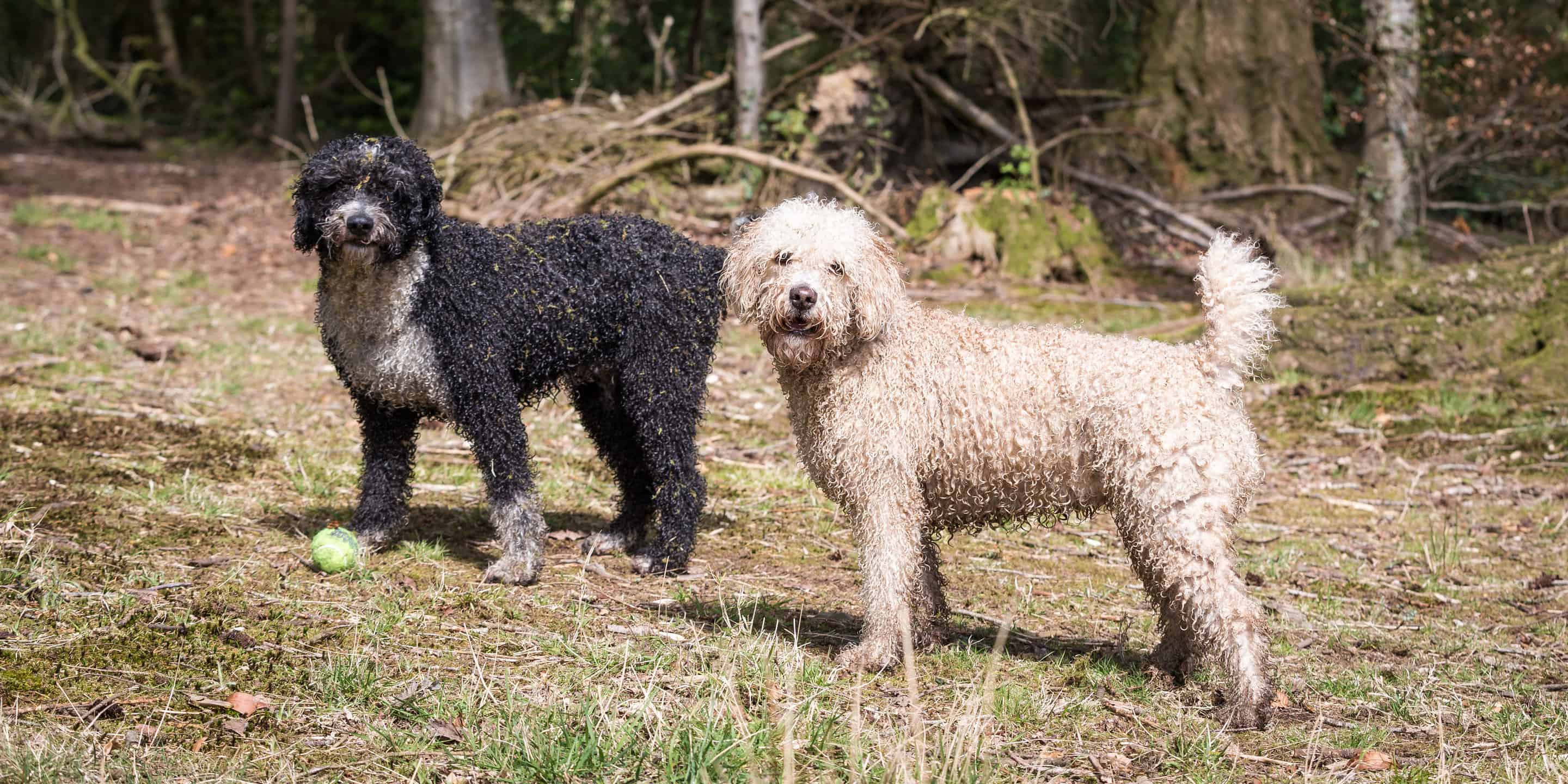
A white Portuguese water dog is the least common color you’ll see in the breed.
©Daz Stock/Shutterstock.com
It’s rare, but Portuguese water dogs can be fully white. It can be confusing, as a white Portuguese water dog may look similar to a poodle. However, the coat and body type will be what clarifies the difference. Portuguese water dogs typically have a somewhat stocky and solid, muscular body type. Their fur may be more wavy than the tight curls you see on poodles.
Common: Brown
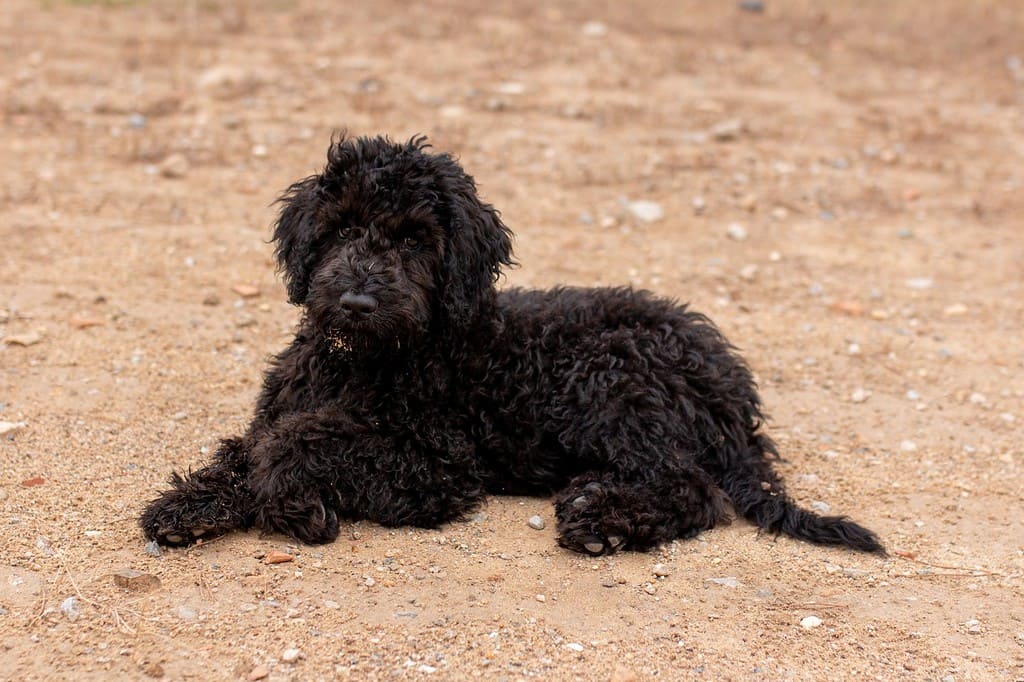
Portuguese water dogs can come in a variety of shades of brown, some so dark they almost look black.
©Nika Stemberger/Shutterstock.com
Solid Brown is the fourth most common color for the breed. The tone of brown can be anything from deep, dark brown to a rich chocolate brown to tan or even a “liver” color. Additionally, brown Portuguese water dog puppies may originally be a dark shade of brown but fade as they grow older.
More Common: Black
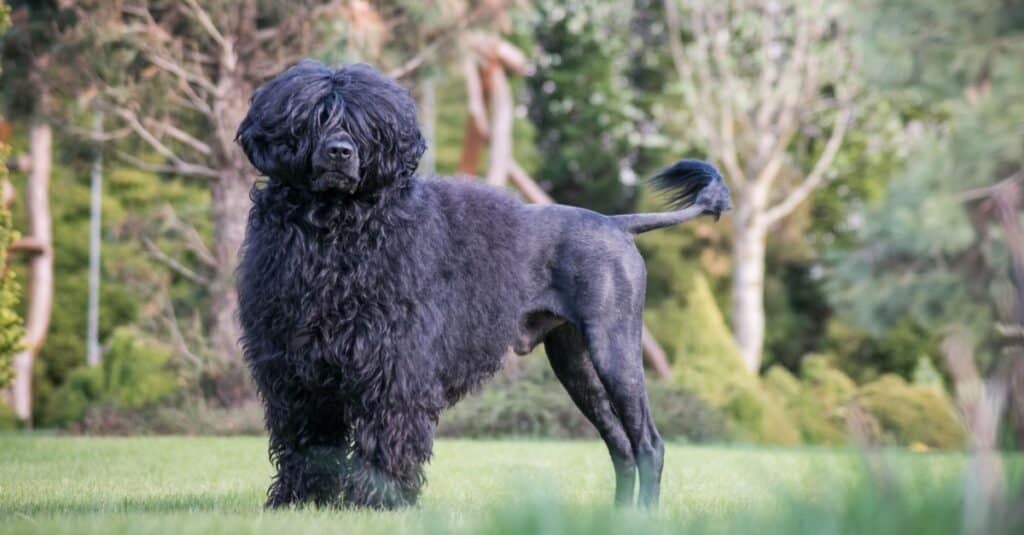
Solid black Portuguese water dogs are a common color for the breed.
©Eve Photography/Shutterstock.com
The most common solid color for Portuguese water dogs is black. A black Portuguese water dog usually has a black nose and black-colored or dark brown eyes, as well. And if you’re curious, the skin of a black or black and white Portuguese water dog usually has a bluish tone to it.
More Common: Brown With White Markings
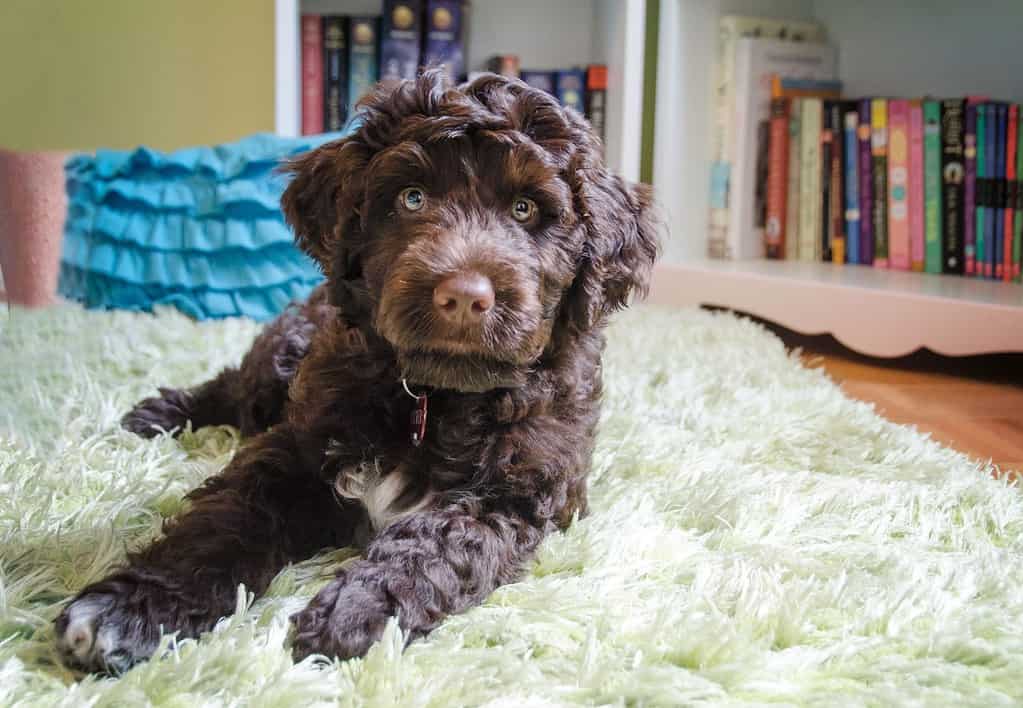
Though some Portuguese water dogs have light-colored eyes, it’s not considered standard.
©Maria Bell/Shutterstock.com
The second most common color is a combination of brown with white markings. Again, the white markings are commonly on the chest, face, and feet.
In Portugal, the breed standard should not have more than 30% white markings. The white markings can appear on the chest or the chin, which has the nickname “milk chin.”
Most Common: Black With White Markings
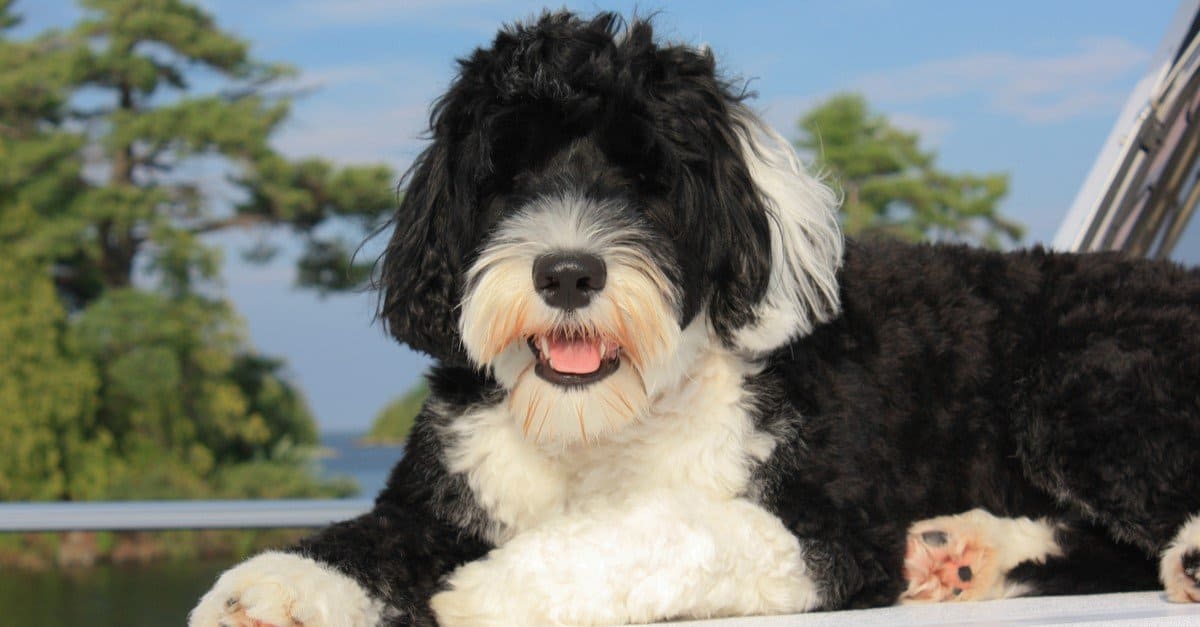
When you picture a Portuguese water dog, you may picture the popular black-and-white color combination.
©Lynda McFaul/Shutterstock.com
Portuguese water dogs often appear with a color combination of black with white markings. It’s one of the most common colors for the breed. They may have white splashes on their chest, face, and feet. They may also have a splash of white at the tip of their tails.
Though Portuguese water dogs are made for the water, their beautiful fur does require some special care. Their coat is water-resistant and double-coated. They have a dense undercoat that helps keep them warm in cold waters. However, this type of fur can easily mat, so it needs to be brushed out regularly. A coat with mats can be painful for a pup. It might pull on the skin, making the dog extremely uncomfortable.
The curly hair of Portuguese water dogs is usually worn in a few different ways. Most pets tend to sport what is called a “retriever cut”, where the coat is the same length all over, around one inch. Some Portuguese water dogs wear a cut known as the “lion clip. With this style, the hindquarters, muzzle, and base of the tail are shaved, while the rest of the coat is left long. The original purpose of this style was to help the dogs move more easily in water and also to keep them warm at the same time. Whatever style they wear, these lovable, sporty dogs need regular grooming to be the most comfortable.
Ready to discover the top 10 cutest dog breeds in the entire world?
How about the fastest dogs, the largest dogs and those that are -- quite frankly -- just the kindest dogs on the planet? Each day, AZ Animals sends out lists just like this to our thousands of email subscribers. And the best part? It's FREE. Join today by entering your email below.
Thank you for reading! Have some feedback for us? Contact the AZ Animals editorial team.

